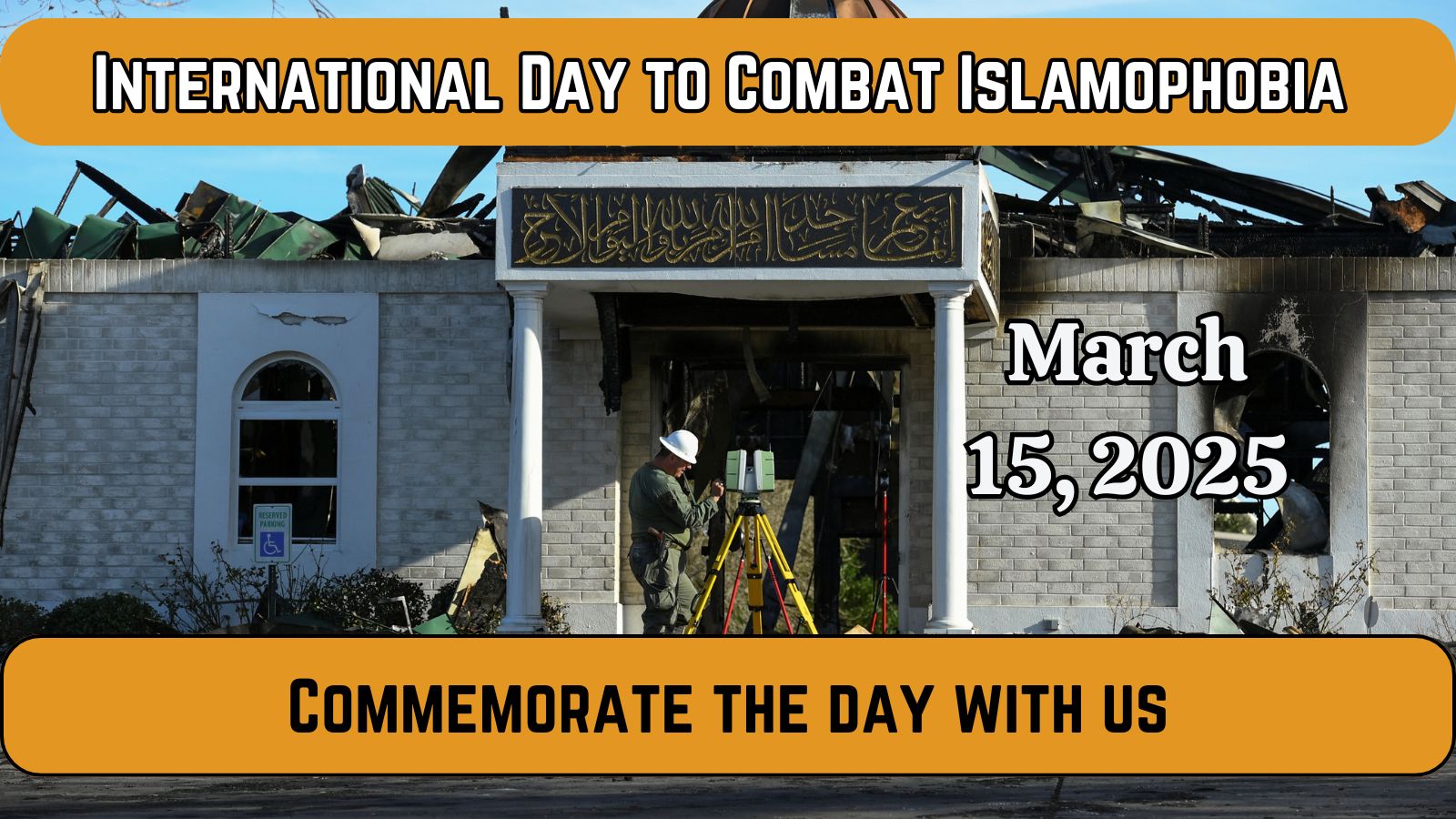
Statement of International Muslim Organizations and Human Rights Civil Society Organizations on the 2025 United Nation’s International Day to Combat Islamophobia
Statement of International Muslim Organizations and Human Rights Civil Society Organizations on the 2025 United Nation’s International Day to Combat Islamophobia
In the name of God, the Most Compassionate, the Most Merciful
All praise and thanks belong to God, the Lord of the Worlds,
May peace and prayers be upon Prophet Muhammad
Brenton Tarrant murdered 51 people and injured another 40 as he attacked two mosques in Christchurch, New Zealand on March 15, 2019. He streamed this horror live on Facebook. In 2025, the undersigned Muslim organizations and human rights civil society organizations commemorate the UN’s International Day to Combat Islamophobia by highlighting the increasingly troubling role of social media platforms in perpetuating Islamophobic hate across the world.
According to the United Nations, “Islamophobia is a fear, prejudice, and hatred of Muslims that leads to provocation, hostility, and intolerance by means of threatening, harassment, abuse, incitement and intimidation of Muslims and non-Muslims, both in the online and offline world. Motivated by institutional, ideological, political and religious hostility that transcends into structural and cultural racism, it targets the symbols and markers of being a Muslim.”
The massive profits social media platforms provide to corporations have generally rendered corporate leaders passive regarding the role of their platforms in operationalizing Islamophobia. We address our call to action to those leaders, employees, and influencers who see humanity as something greater than coin.
Even when reported, the removal of Islamophobic content appears to be deprioritized. Research produced in Australia in 2022 concluded that there were “3,759,180 Islamophobic posts made on Twitter between 28 August 2019 and 27 August 2021″ and that “only a mere 14.83% of anti Muslim tweets end up being removed.” The authors of the 2023 European Islamophobia report noted that the Estonian Human Rights Centre, which “monitors the occurrence of hate speech on social media and checks whether social media platforms (Facebook, Instagram, TikTok, YouTube, and X) remove hate speech when it is reported through the appropriate channels,” found that between March and April 2023, “anti-Muslim hate speech amounted to 15% of all the reported posts” and “ranged between 4% and 6% of the reported posts” in the following reporting periods.
The consequences of platforming hate are murder, violence, and profit. The Center for the Study of Organized Hate’s (CSOH) “Streaming Violence: How Instagram Fuels Cow Vigilantism in India” details how that platform is used to promote communal violence against Muslims, particularly by Hindutva nationalists. The U.S.-based Public Broadcasting Service (PBS) noted, “Close to a third of the more than 1,000 Instagram accounts researchers tracked over six months posted videos of brutal physical assaults.” According to reporting, these accounts are permitted to fundraise from their posts. In a similar vein of fundraising from hate, The Intercept reported in 2023 that, “A series of advertisements dehumanizing and calling for violence against Palestinians, intended to test Facebook’s content moderation standards, were all approved by the social network.” Also in 2023, Canada’s Standing Senate Committee on Human Rights concluded that “the rise of hate-based discrimination in Canada has been facilitated by both mainstream and extremist social media platforms, through which thousands of extremist channels, pages and groups have been formed.” The report added, “The Canadian Human Rights Commission noted that the man who killed six people in the 2017 Québec City mosque shooting, ‘was inspired and emboldened by hateful rhetoric he found online. What he saw and read gave him the validation and encouragement he needed to pull the trigger.’” In the UK, the spread of misinformation on social media platforms following the Southport stabbings in 2024 fueled widespread anti-Muslim riots and hate crimes, highlighting how unchecked online hate can rapidly escalate into real-world violence and harm.
Given these painful facts and the hate that benefits from them, we, the undersigned Muslim organizations, call on the leaders, employees, and influencers within the social media industry to implement the following concrete actions: (1) develop transparent reporting systems with clear timelines for content review and removal, (2) prohibit monetization of content that promotes anti-Muslim bigotry or violence, (3) create robust appeals processes for both removed and retained content, (4) publish regular transparency reports specifically tracking Islamophobic content and enforcement actions, and (5) engage in meaningful consultation with Muslim communities and organizations to improve detection of coded language and evolving forms of hate speech.
It is not enough to merely react to hate once it has already spread. We urge all stakeholders to implement these changes immediately to create a safer digital environment for Muslims around the world.
Australian Muslim Advocacy Network (AMAN) (Australia)
The Bridge Initiative (United States)
Canadians United Against Hate/Canadiens Unis Contre la Haine (Canada)
Center for Education and Research “Nahla” (Bosnia and Herzegovina)
Collective for Countering Islamophobia in Europe (CCIE) (Europe)
Comité Justice & Libertés Pour Tous (France)
Council on American-Islamic Relations (CAIR) (United States)
Forum of European Muslim Youth and Student Organisations (Europe)
International Islamophobia Studies Research Association (Worldwide)
Islamic Community in Bosnia and Herzegovina (Bosnia and Herzegovina)
Islamic Council of Victoria (Australia)
Islamic Women’s Council of New Zealand (New Zealand)
Islamophobia Studies Center (United States)
The March 15th -Combating Islamophobia (United States)
Muslim Council of Britain (MCB) (United Kingdom)
Muslim Rights Watch Netherlands (Netherlands, Europa)

 Search
Search